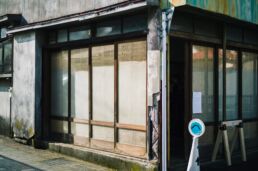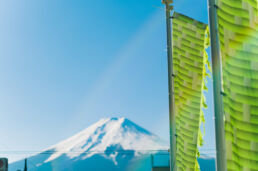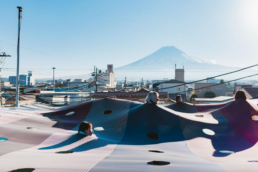With the advent of the Corona disaster, I’ve been hearing the word “workation” a lot.
The term “workation” has been coined by combining the words “work” and “vacation.” By teleworking while taking a vacation in a tourist spot or resort area, you can increase your creativity and productivity. At the same time, this increases the number of visitors to local areas.
Today, as the Corona disaster shows no sign of abating, I took a peek at Saruya and found that guests were coming and going, though fewer than before. Among the foreigners living in Japan who seem to have come for a short vacation and the young people enjoying their trip to nearby prefectures, there are many people working in the common areas. They seemed to have been here for a long time, and while coffee brewed in the kitchen they were on zoom conversations or typing away. They are mainly younger white-collars working for a company in Tokyo and taking advantage of the teleworking possibilities at their workplace to stay at Saruya while enjoying their time in Fujiyoshida.
Starting around October 2020, Saruya held an initiative to promote workation in cooperation with Loftwork Inc. and the city of Fujiyoshida. The project, called “Shigotabi,” (Japanese equivalent of “workation”) offered a number of unique activities like various workshops by artists with ties to the region, and talk sessions with a dinner by D&DEPARTMENT to connect the local food and textile industry.
In fall 2021, the second edition of Shigotabi will host different events including a walking tour of the trails of Mt.Fuji, an online conference discussing future urban development and more.
In addition, the ongoing “Shigotabi Radio” features a guest every month to discuss the relationship between “work” and “travel.
Many people, including Loftwork employees, come regularly for several days at a time and sometimes organize group working sessions which are a great example of workation encouraged by a company to benefit their employees productivity and well-being. But what are the benefits of workation at Saruya and Fujiyoshida?
Looking back at my personal experience, in addition to my natural love of travel, my work often takes me to the countryside, so I inevitably find myself working while traveling. Sometimes on the terrace of a hotel where I can hear the sound of waves, sometimes in a house overlooking a Japanese garden. I’ve also used modern libraries near my destination, or borrowed a desk from another company’s office. Going further back, I worked at a resort hotel for a long time, so my workplace was a resort surrounded by the ocean and forest. On my days off, within a 10-minute drive, I could go to a cafe overlooking the Pacific Ocean or an old-fashioned house cafe nestled in a forest of white birches.
Anyway, what I realized from my experience of working in various places was that I could clearly get more done when I was traveling. It’s also easier to think and concentrate. It is probably true that “increased creativity and efficiency” is generally considered to be an advantage of working on vacation.
At the same time, I have come to understand the “conditions” that make a work vacation more effective.
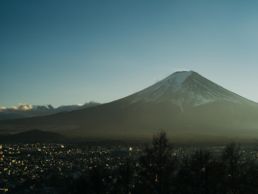
The dualism between city and nature might not be relevant here
In general, people tend to think that a quiet, nature-rich place would be more appropriate for a busy city dweller to relax and work. As a matter of fact, wi-fi and power are not always available, and when confronted with the overwhelming nature, the majestic rhythm of the place doesn’t seem to match with the focus required by work. I feel that if I go to such a place, the right way to spend my time there is to rest thoroughly rather than work.
On the other hand, the right amount of noise from people coming and going, and the slight stimulus of discovering something new in a familiar landscape, can help me concentrate on my work.
If you are looking for noise, stimulation, and facilities, you might say that the city is the place to be, but that’s not true.
In general, the word “exciting” is often used to describe cities like Tokyo. But in reality, there is too much stimulation in such cities. New businesses, new technology, the countless faces of people passing by, the latest fads and upcoming trends, there is so much information that there is no room to breathe and people get exhausted. This is why, after living in a city for a long time, people develop a habit of trying to get through the information and ignore the noise around them. In other words, they close their ears and eyes (or rather, physically close them with earphones or smartphones) to protect themselves from the excess of stimuli.
In a way, when closing yourself off like that, the situation is not so different from standing in a desert where there is no human activity. (I’ve often thought of it as the Tokyo desert, but I guess younger people don’t get it. I guess I’m just not part of that generation either.)
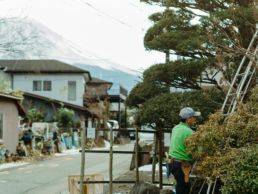
Fujiyoshida is a place where everyday life is "a little off"
Wandering around the streets of Fujiyoshida, you will find shaky buildings and old-fashioned stores. If you are ready to get lost and walk down a narrow alley, you will see old signs and might come across an irrigation channel. There is a definite sense of people’s daily lives, and you can feel the communication between neighbors. You can see people helping each other with their problems, and walking to each other’s doors for advice. The way the snow falls on Mt. Fuji gives you a sense of the season, and you can see that very fashionable clothes and music are being made in the city. When you get hungry, local joints will deliver your food, no need for Uber Eats there.
The city life centered around the main shopping street is not necessarily old-fashioned, but actually very rational and essential. Tokyo must have been like that in the past. And as I take pictures and look around, my imagination starts to run wild, and before I know it, I have an idea for my next project.
Of course, for the people who live there it is ordinary. But for those who live in the city, it feels extraordinary. It’s not an overwhelmingly different world that makes you stop and marvel, but a world that is nostalgic and just a little bit off from your everyday life. Such a perfect degree of disorder may open up the antennae of the five senses and thoughts that had been closed off due to too much information in the city now progressively awaken.

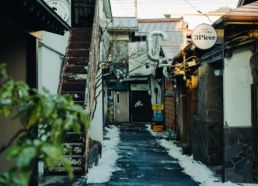
Saruya plans to continue to organize new “Shigotabi” projects as a gateway to the city of Fujiyoshida. If you want to change the way you work, change the scenery a little, or experience a pleasant atmosphere, you should definitely participate.
Notice: Saruya HOSTEL will have a special promotion for those who want to go on a work vacation from September. For more details, please visit the following URL.
Written by:
Yumi Igarashi
I live in Yamanashi Prefecture. I worked for a resort hotel management company for 10 years, and after visiting Karuizawa, Ishigakijima, and Fukushima, I've been working as a freelance hotel management advisor and writer for several years. I don't remember how I got involved with Saruya, but I've been coming and going, helping out with work or just visiting.


